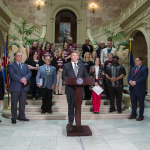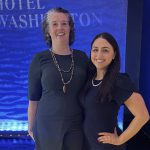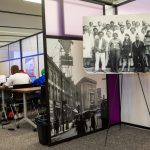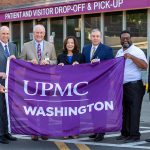 The University of Pittsburgh Cancer Institute (UPCI) participated in the nationwide Cancer Moonshot Summit on June 29. The summit was hosted and led by Vice President Joe Biden in Washington D.C. with over 270 organizations participating regionally, including UPCI.
The University of Pittsburgh Cancer Institute (UPCI) participated in the nationwide Cancer Moonshot Summit on June 29. The summit was hosted and led by Vice President Joe Biden in Washington D.C. with over 270 organizations participating regionally, including UPCI.
The Cancer Moonshot initiative was launched in January 2016 during President Obama’s State of the Union Address. The $1 billion initiative aims to make more therapies available to patients, improve cancer treatment and make it more detectable. The ultimate goal is to double the rate of progress in cancer research towards a cure.
In addition to the 6,000 individuals participating regionally across the U.S., Vice President Biden was joined by 350 oncologists, researchers, technology experts, cancer patients and families in Washington, D.C. This was the first time stakeholders representing all types of cancers convened under one national charge on doubling the rate of progress in cancer research, prevention and care.
“Our overall goal at UPCI is to reduce the burden of cancer,” said Edward Chu, M.D., UPCI’s deputy director, during his opening remarks.
The leaders of the Moonshot initiative will be receiving the notes and ideas from all the remote discussions that took place, and will use them to help better cancer policy, research and care.
The UPCI discussion was effective and productive. American Association for Cancer Research President and UPCI Director Nancy Davidson, M.D. and Dr. Chu led the conference, which broke into several smaller discussions, ranging from better collaboration drug development to improving clinical trial access for patients.
“Defeating cancer is as much public policy as scientific discovery,” said Marina Posvar, Patient Navigation Coordinator at UPCI.
Improvement and changes to public policies, trial advertising methods, community roles and insurance plans were all suggested.
Overall, the conference was a great opportunity for collaboration and discussion, and showed progress towards the goal of reducing the burden of cancer, and ultimately finding a cure. As Ms. Posvar said, “Advocacy, education, and action work together to make the difference in curing cancer.”







